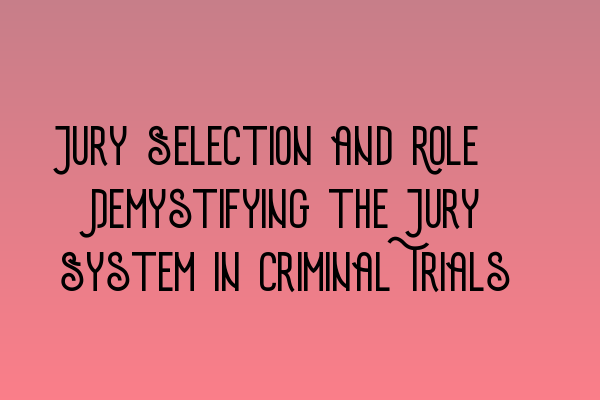Jury Selection and Role: Demystifying the Jury System in Criminal Trials
When it comes to criminal trials, one of the key components of the justice system is the jury. The jury consists of a group of impartial individuals who are responsible for assessing the evidence presented in a case and determining the guilt or innocence of the accused. In this article, we will delve deep into the process of jury selection and explore the role of the jury in criminal trials.
The Jury Selection Process
The process of selecting jurors for a criminal trial is known as jury selection or voir dire. Voir dire is a crucial stage in the trial process as it ensures that an unbiased and fair jury is selected. The purpose of jury selection is to eliminate any potential biases, prejudices, or personal connections that may influence the jurors’ decision-making.
During voir dire, both the prosecution and the defense have the opportunity to question potential jurors to determine their suitability for the trial. The attorneys may ask questions regarding the jurors’ background, experiences, and any potential biases or prejudices they may hold. This allows the attorneys to identify individuals who may have a bias or prejudice that could affect their ability to impartially assess the evidence.
It is important to note that not all individuals are eligible to serve on a jury. Certain criteria must be met, such as being a legal adult, being a citizen, and having no disqualifications based on criminal history or mental capacity. The final selection of the jury is based on a combination of random selection and the parties’ abilities to challenge certain jurors for cause or through peremptory challenges.
The Role of the Jury
Once the jury has been selected, their role in the criminal trial begins. The primary duty of the jury is to determine the facts of the case and apply the law as instructed by the judge. The jury must carefully evaluate the evidence presented, including witness testimony, physical evidence, and any relevant documents or exhibits.
The jurors are responsible for assessing the credibility of the witnesses and deciding whether the prosecution has proven the defendant’s guilt beyond a reasonable doubt. It is crucial for the jurors to remain impartial and make their decision solely based on the evidence presented in court.
The role of the jury is a significant one, as their decision can ultimately decide the fate of the accused. Their verdict must be unanimous in criminal trials, meaning all members of the jury must agree on the defendant’s guilt or innocence.
The Importance of Jury Selection
Jury selection plays a crucial role in ensuring a fair trial for both the prosecution and the defense. By carefully examining the potential jurors, the attorneys can identify any biases or prejudices that may affect their ability to make an impartial decision. This process helps to prevent any unfair advantage or disadvantage to either party in the trial.
In a criminal trial, the accused has the right to be judged by a jury of their peers, meaning a group of individuals who represent a cross-section of the community. This ensures that the decision-makers in the trial are from diverse backgrounds and can bring different perspectives to the case.
It is essential for the attorneys to conduct a thorough jury selection process to protect their client’s rights and ensure a fair trial. By asking the right questions and considering the potential jurors’ responses, the attorneys can identify individuals who are likely to be impartial and capable of making a fair decision based on the evidence.
Conclusion
The jury selection process and the role of the jury in criminal trials are integral parts of the justice system. They uphold the principle of a fair trial and ensure that the accused is judged by an impartial group of individuals. By understanding the jury system, we can demystify its complexities and appreciate its importance in delivering justice.
If you would like to learn more about the SQE Criminal Law & Practice exam and preparation, we offer comprehensive SQE 1 Preparation Courses and SQE 2 Preparation Courses. Stay updated with the latest SRA SQE Exam Dates to plan your studies effectively. You can also enhance your knowledge and test your understanding with our SQE 1 Practice Exam Questions and SQE 1 Practice Mocks FLK1 FLK2.
